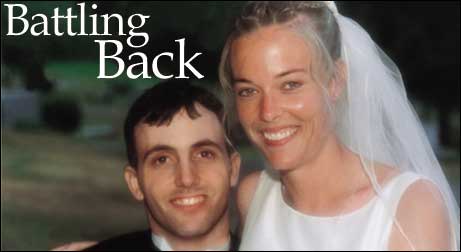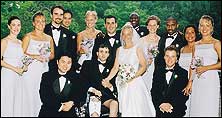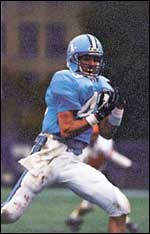 |
 |
 |
 |
|
FEATURE The time seemed perfect. And what better place to shoot some summer hoops than in Chapel Hill, N.C., where basketball courts are considered hallowed ground? The park is just down the road from the post-grad bungalow that Mike Sardo '93 and Kathleen Johnson '93 share as Columbia classmates and soul mates, not to mention husband and wife. The All-Ivy League couple had been married the summer before, up in Maine. Mike appears apprehensive. He hadn't tried making a lay-up, never mind a free throw, in a long, long time. Kathleen is brimming with her usual courtside confidence. Pure shooters never lose their touch, or their swagger. Mike chucks up so many brutally bad shots that he could rebuild The Yellow Brick Road. With each miss his competitive juices flow stronger and the defense mechanisms of an athlete kick in. "I can't believe how bad I am," moans Mike as his shots rim out, fall short and carom like pinballs. "You weren't that good to begin with!" snaps Kathleen. Tough love? Perhaps. But it is just what they need. Mike cracks up first. Kathleen succumbs the moment she realizes Mike's tears are those of laughter. A flood tide of memories return. How many times had a coach in high school, or at Columbia, used a sarcastic, smart-alecky remark to defuse tension and deflate an athlete's ego. Kathleen is correct. Mike hadn't been that good in basketball at Bethpage High on Long Island, more of a scrappy, hustling, dive-on-the-floor type of player than a big scorer. Football had been his sport. He was a high school quarterback who transformed himself into an All-Ivy wide receiver. As a senior, he caught a school-record 13 passes against Cornell, and a game-winning 40-yard TD against Brown, and ranked fifth in receptions in all of Division 1-AA. Kathleen had been the hoops superstar, for perennial power St. Peter-Marian of Worcester, Mass. before twice serving as Columbia's Academic All-Ivy hoops captain. On this June afternoon, Mike does have a convenient alibi, one that he and Kathleen are keenly aware of, but choose to ignore: For the first time in his life, Mike is shooting at the basket from a wheelchair. That cruel fact has changed his perspective, on the court and off, forever. When Mike and Kathleen graduated from Columbia in 1993, success seemed to be a slam-dunk. They had been All-Ivy League scholar-athletes and had aspirations to earn doctoral degrees and become educators. Mike, a chemistry major, worked in the cardiovascular lab at Columbia Presbyterian Medical Center for about three years to earn a grub-stake before matriculating at North Carolina to pursue a Ph.D. in biochemistry. Kathleen, a history major, played out her fantasies with a season of pro ball in Europe, then coached hoops and taught history to inner-city high school girls at St. Michael's in Manhattan. They had become college sweethearts as juniors after taking a course, "The History of Ancient Mesopotamia," together. They had plans to get settled, get on their feet financially and get married. By the spring of 1998, the wedding was set for July of the next year. After the honeymoon, Kathleen would teach in North Carolina as Mike, his Ph.D. course-work completed, would plow through the research for his doctoral thesis, delving into the medical mysteries of cancerous brain tumors. But as Robert Burns wrote more than two centuries ago, "The best laid schemes o' mice and men gang aft a-gley."
In the fall of 1997, Mike had been invited to participate in a research project. "All I had to do is give some blood. And for 10 cc's I would get 20 bucks." Easy money, thought Mike, who was living off an annual $14,000 University of North Carolina grant. In fact, he was all set to sign up for another double sawbuck when an e-mail arrived telling him his blood was abnormal and it couldn't be used for the project. "They told me that one factor that affects blood-clotting was a little bit off. It was nothing severe. I did bleed a bit more when I cut myself shaving, but I felt fine. So I didn't have it checked out. I had to get home for Thanksgiving and was in a rush. In hindsight, I probably should have had a blood work-up right then." In April 1998, Mike began experiencing back pain. He shook it off, taking various mild medications. But his usual high level of energy began to dissipate, and he developed other discomforts such as abdominal pain, night sweats, loss of appetite and weight. In May, Mike underwent blood and bone marrow testing at the hospital affiliated with UNC. The diagnosis was grim, the irony inescapable. Mike, a scholar searching for a cure for cancer, had acute lymphocytic leukemia. The leukemia was in Stage 4. How bad is that? "Well, Stage 5 is dead," Mike replied with his typically wry humor. The cancer had spread, using spinal fluid as its launching pad. Chemotherapy could not be administered simply by IV. A strong dose had to be injected directly into the spine. It was a matter of life and death. When Mike returned to his hospital room after blood testing, Kathleen was waiting. When the results were known, Kathleen made the most important decision of her life more quickly than she ever had thrown a bounce pass on a fast break. She left her New York teaching job, and has never left Mike's side since. One would imagine things could not get worse than facing down death from a fast-moving cancer. But they did. While the chemotherapy had sent Mike's leukemia reeling into remission, he began losing the feeling in the powerful legs that had made him a three-sport athlete. The chemicals administered over four months to halt his cancer somehow had caused spinal-cord damage, leaving Mike paraplegic. To this day, doctors cannot say with certainty exactly what happened. "The cause of his paraplegia is still unclear to us," wrote Dr. Karen Albritton in a report. Usually trauma is the culprit, damaging or even severing the spinal cord. An MRI or other exam can locate a visible abnormality. Or perhaps a degenerative disease will be identified. Not so in Mike's case. "There is still a lot of guessing," Mike says. Mike and Kathleen have endured much heartache since May 1998. The leukemia remains in remission; Mike remains in a wheelchair. Due to his paralysis and treatment, Mike's hip joints calcified. Earlier this year, Mike underwent two major surgeries to remove bone build-up in each hip.
For almost a year, he hadn't been able to sit up correctly in a bed, chair or wheelchair. Being bed-ridden for long stretches caused a recurring problem of sores, requiring Kathleen to change the dressing daily. He could not do much without Kathleen's assistance. She became his constant care-giver, getting only brief respite from a physical therapist. Being dependent on Kathleen has caused Mike, a fiercely independent and self-sufficient man, frustration and anguish. You can imagine the rest. And the unrest. Early on, Kathleen also taught junior high school in North Carolina. As vital as her income was, she finally had to face the obvious: Mike needed her around more and more. "The decision wasn't hard. We had no choice. I love him and had to be there for him," remarked Kathleen. "Kathleen has been incredible, the only one in the world who would put up with this," says Mike. "She takes me to the doctors, loads me in the car, drives me everywhere. This is not what we had planned." Plans change. Mike and Kathleen's wedding plans changed, but only in the minor details. Only weeks before the big day, Mike's right leg had been broken during a physical therapy session, so at the wedding it stuck out from his wheelchair at a 45 degree angle, a black sneaker on his foot. Kathleen, to nobody's surprise, was a beautiful bride with her white gown and radiant smile - and underneath it all, her basketball low-cuts. On July 24, 1999, before family and friends, including many from their Columbia days, Mike reached up and held Kathleen's hand as they exchanged vows in a starkly simple white church in Cape Elizabeth, on the Maine seacoast. The occasion was upbeat, joyous, at times bordering on rowdy. At the reception, friends and Columbia classmates like Lisa Rutkoske '93, Penny and Tony Apollaro '93, Nkem Okpokwasill '93, Kerry Lunz '93 and Richard Park '93E stormed the dance floor, spinning Mike in his wheelchair. Kathleen's mom, Susan, jitterbugged with Mike's dad, John. Bobby Johnson, a former college hoop star, danced with his protégé daughter. Barbara Sardo had her daughter Katherine, Mike's 24-year-old sister afflicted with cerebral palsy, swaying to the music. There was love caressed by a sea breeze. The congregation sang Beethoven's "Ode to Joy," its words hauntingly poignant: Ever singing march we onward, Mike and Kathleen did not leave on a honeymoon. They returned to Chapel Hill, to get on with their life, their struggle. For the past year, Mike and Kathleen have battled back. Mike had to deal with two hips operations, bed sores that still come back to haunt him, fevers, endless testing, constant therapy - and, hardest of all, learning to cope with life in a new way. He has had to develop upper-body strength to compensate for his loss of leg use.
He has had to learn to do for himself, from getting in and out of bed to taking showers, to unloading himself from his wheelchair into the car, to eventually getting on a public bus to get to work. During that time, while unable to get back in the swing of Ph.D. lab research, Mike turned to the great works of literature such as A Tale of Two Cities for solace and wisdom. He spent countless hours at the computer while he healed from hip surgery, gearing up for his re-entry into the world of academia. Kathleen served as his guardian and angel. She also began taking courses for a master's in education, which she knew would be required to land a teaching job good enough to pay the bills. She is in her second year of that pursuit, enjoying it more now that she may elect courses that she truly enjoys, such as African-American history. They had received help from family and friends, though Mike and Kathleen don't like asking for anything. Mike's father, John Sardo, is self-employed, running a modest home-improvement construction company. He has built access ramps and other alterations to Mike and Kathleen's home. Kathleen's parents, both teachers, visit during school vacations and give everything they can. Kathleen's brother K.C. Johnson, a history professor at Brooklyn College, has been supportive, emotionally and otherwise. Wally Halas, a former Columbia men's basketball coach, has managed a fund from his position as assistant director of the Institute for International Sport, located at the University of Rhode Island (see box). Friends, alumni and relatives have been generous. About $40,000 has flowed into the fund and to date about $35,000 has been spent to cover necessary living expenses. Due to recent setbacks - recurring fevers caused by sores opened from wheelchair use - Mike has not been able to resume his doctoral studies. His $14,000 research grant was not renewed. Bed rest has been prescribed to encourage healing. Meanwhile there are major debts and expenses on the horizon as Mike still plans to pursue his degree. Insurance has handled about three-quarters of Mike's astronomical medical bills, leaving a significant amount. The couple needs a vehicle that can accommodate Mike's wheelchair and be modified so Mike can drive it. After five years, Mike expects to get a clean bill of health regarding the leukemia. But the doctors remain uncertain as to what exactly caused Mike's paralysis. There is funding for research into paralysis caused by trauma to the spine, but because of the rarity of cases like Mike's, where the damage was caused by high-dose chemotherapy, there is little funding and research. Someday, Mike and Kathleen would like to contribute to such research. To this day, Mike and Kathleen do not bemoan their fate, maintaining the determination and upbeat attitude that was eloquently described by New York Times sports columnist Ira Berkow on January 3, 1999, when he told their story. When asked separately, their response is the same. They are overjoyed that Mike's cancer is in remission. "I feel lucky to be alive," Mike said. They accept Mike's disability as an unfortunate fact that they must deal with, and when one gets down, the other is there to be uplifting, often with a well-timed wisecrack. Kathleen, normally composed, admits she loses it on occasion. Once she got in a man's face, chewing him out in no uncertain terms for leaving his pickup truck in a space reserved for the handicapped. "I didn't know Kathleen knew some of those words," her dad says with an admiring laugh.
"Sometimes it gets overwhelming, and rudeness always sends me over the edge," commented Kathleen. Mike tackles frustration with wit and humor, even dark humor. After enduring treatment for an endless series of medical hits - leukemia, pneumonia, calcified hips, broken leg, fevers and painful open wounds - Mike pleaded with doctors: "Hey, I want to go back to being just a cripple." Mike and Kathleen will not deviate from their plan. Kathleen will get her master's, and whatever else is necessary, and teach history. Mike will obtain his Ph.D. and teach biochemistry at the college level, continuing to do cancer research. They would like to start a family. They will be active in sports. They will remain close to family and friends. "We both want to be contributors," Mike explained. "We are determined to achieve good no matter what obstacles are put in our path. It is a test of wills. But I've always been stubborn and Kathleen is persistent." "Who knows...someday we may even get to go on a honeymoon," quipped Kathleen. About a half hour after being interviewed, Mike was on the phone. He had forgotten to mention something that he felt was important. "We haven't given up hope. We haven't stopped looking for a way for me to walk again. I wanted to make that clear." Mike does not give up easily. He remembers the lessons learned from playing on some losing football teams at Columbia. "It's easy to practice when you're winning," he says. The challenge is to stay at it in the face of misfortune. In his senior year, Columbia's football team was 1-7 with two games left. Time to fold up the tent? Not with Mike Sardo in the lineup. Columbia upset 7-1 Cornell, which was in the hunt for the Ivy League crown, then closed out the season by beating Brown. The Lions went out with a roar. Mike Sardo has been knocked down. But with Kathleen at his side, and with a helping hand from admiring friends, he vows to make a similar comeback. About the Author: John Gearan is a sports columnist for the Worcester (Mass.) Telegram and Gazette and serves as a volunteer coordinator for the Mike Sardo Fund
|
|
|||||||||||||||||||||||||||||||||||||||||||||||||||||||||||||||||||||
 With Kathleen at his side, Mike Sardo vows
never to give up.
With Kathleen at his side, Mike Sardo vows
never to give up.


